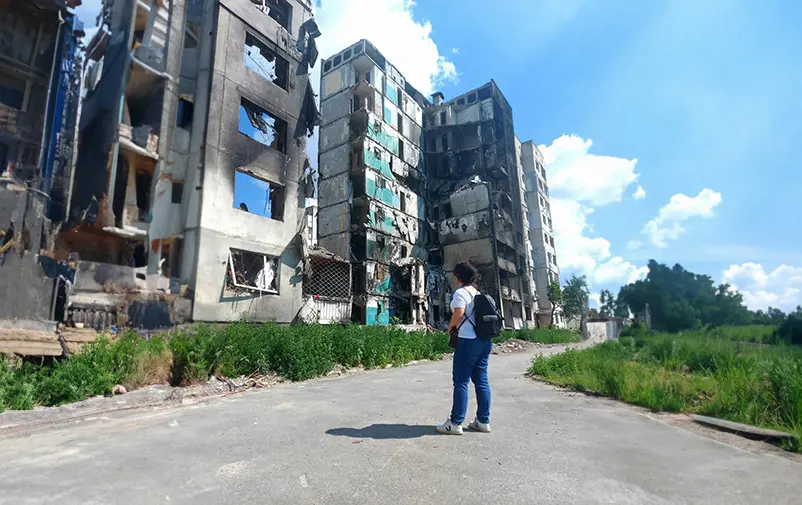Navigating Risks and Threats: Frontline Monitors Equipped for Hostile Environments
Amidst the perils of explosive devices, hostilities, and distressing civilian accounts, frontline monitors play a pivotal role in documenting human rights abuses within conflict zones. However, these monitors themselves confront significant stress and danger, requiring adept navigation of challenging circumstances to safeguard their own well-being as well as the safety of the vulnerable populations they serve. How can they adequately prepare?In the wake of Russia’s full-scale invasion of Ukraine in February 2022, the OSCE Office for Democratic Institutions and Human Rights (ODHIR) initiated monitoring of violations of international humanitarian and human rights law, deploying monitors across Ukrainian territory and beyond its borders. Their mission: to contribute to the pursuit of accountability for the potential violations of human rights and laws of war occurring in Ukraine. Among the dedicated personnel were Marine Constant and Aleksandar Sekulić, both assuming critical roles within the Ukraine Monitoring Initiative.
Before embarking on their deployments, they participated in Hostile Environment Awareness Training (HEAT), a course regularly organized by FBA to equip civilian peace operations personnel with the tools and strategies requisite for navigating the spectrum of risks intrinsic to conflict zones.
– Although I had worked in conflict-affected settings previously, the scale of the conflict in Ukraine was unprecedented for me. Without having attended the HEAT course, it would have been much more stressful. The training really helped me to feel confident and it also manifested during my field experiences, reflects Marine Constant.
Tailored Preparedness: HEAT Training for Ukraine
The HEAT training, conducted in June 2022, was tailored to meet the specific demands of human rights monitoring within the Ukrainian context. A significant portion of the course was centred on training related to chemical and biological hazards, which pose imminent risks in the region.
Marine Constant emphasizes that the opportunity to familiarize herself with explosive devices within a controlled and secure environment proved to be particularly valuable. The knowledge she gained enabled her to identify potential threats, mitigate risks, and understand the various devices mentioned by the survivors of human rights abuses during her interviews.
Furthermore, the HEAT course offered extensive training on situational awareness, endowing monitors with the capability to scan and interpret their environment, anticipate changes, and make informed decisions. This skill is paramount in conflict-affected environments, as highlighted by Aleksandar Sekulić:
– Situational awareness not only transforms your mindset during work hours but also alters your perception of your surroundings at large. The insights I gained from this training were instrumental, not only in Ukraine and other deployment settings but also in my personal life.
Readiness for the Unforeseen: Trauma Care and Beyond
Both Aleksandar and Marine highlight another crucial facet of the course: trauma care. Grasping the nuances of various wound types and the corresponding appropriate initial responses contributed to the development of their own skills sets, nurturing a mindset that is prepared to also handle unforeseeable events and incidents.
– By adopting the mindset instilled by the course, I felt more ready for the unanticipated, and prepared. This seemingly minor detail becomes critical when deployed in a conflict zone. One must maintain a state of alertness the whole time, yet it must be balanced and sustainable; otherwise, energy depletion is inevitable. The training really taught me the importance of this and the essence of stress management, explains Marine.
– Monitoring in Ukraine demanded a level of intensity and preparation beyond that of many other monitoring scenarios we encounter. It encompassed logistical, security, and mental preparedness. The situation becomes especially complex considering that we weren't solely concerned with our personal security but also with the safety of everyone we interacted with, adds Aleksander.
The preparedness cultivated through the HEAT course not only equips monitors and other personnel operating in conflict zones for their high-stakes roles but also empowers them to tackle the unpredictable and uncertain nature of conflict-settings with resilience and resourcefulness. Standing prepared to navigate the diverse challenges that invariably arise is essential for their own and others’ safety and enables them to operate effectively.
The upcoming week-long HEAT course is scheduled for October 23, 2023. Learn more about the course and apply here: Upcoming Courses | Folke Bernadotte Academy (fba.se)
For those who have already completed the course and require a refresher to update their knowledge, FBA offers the opportunity to enroll in ReHeat (Repetition and Extended Hostile Environment Awareness Training), scheduled for November 27, 2023. Learn more about it here: Upcoming Courses | Folke Bernadotte Academy (fba.se)







 >
> >
>

